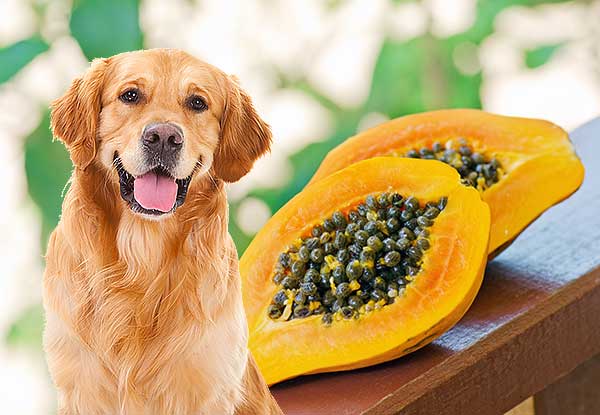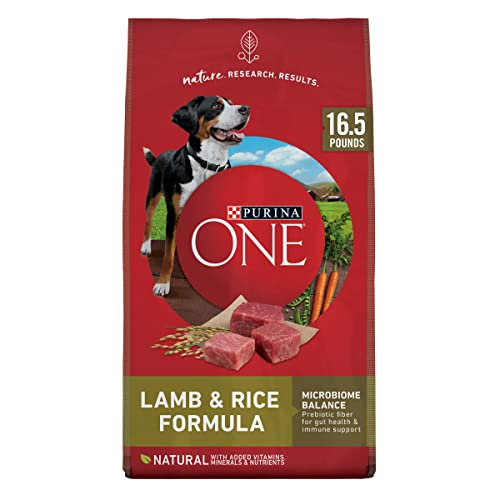Papaya is one of the most popular fruits worldwide. Most fruit lovers swear by papaya’s fiber-rich flesh and delectable taste.
Besides its irresistible flavor, papaya is also incredibly easy to incorporate into your diet. You can consume it as an appetizer, dessert, or use it as an ingredient in smoothies and salads.
Most importantly, papaya is loaded with numerous essential minerals and vitamins. Which is all the more reason to consider snacking on this exotic fruit from time to time.
Now, if you love papaya and also happen to be a proud dog owner, you may have realized that your pooch takes a keen interest in you whenever he spots you gorging yourself on this sumptuous fruit. Sometimes, you might even be tempted to share a slice of papaya with your canine friend.
But as a responsible pet parent, it’s important to establish whether papaya is okay for dogs before feeding this fruit to them. And that takes us back to our question, can dogs eat papaya?
The answer is a resounding yes. Not only is papaya safe for dogs. The fruit also boasts numerous minerals that your canine friend can benefit from, including fiber, potassium, vitamin A, vitamin C, vitamin K, to mention but a few. Papaya is also loaded with powerful antioxidants that might boost your dog’s immunity.
So, if you’ve always considered sharing papaya with your dog, it’s reassuring to know that there’s no harm in doing so. But as you shall find, there are precautions to take before feeding your dog papaya.
Read on for more insights into dogs and papaya. Some of the areas the post shall address include the health benefits of papaya for dogs, potential side effects, and how to feed this fruit to your canine friend.
Is it OK for Dogs to Eat Papaya?
As a papaya-loving dog owner, it’s natural to find yourself wondering, can dogs have papaya?
As we’ve just indicated, papaya is perfectly fine for dogs. But to understand just how safe this fruit is for your pooch, it’s important to back up a bit and familiarize yourself with what dogs typically eat.
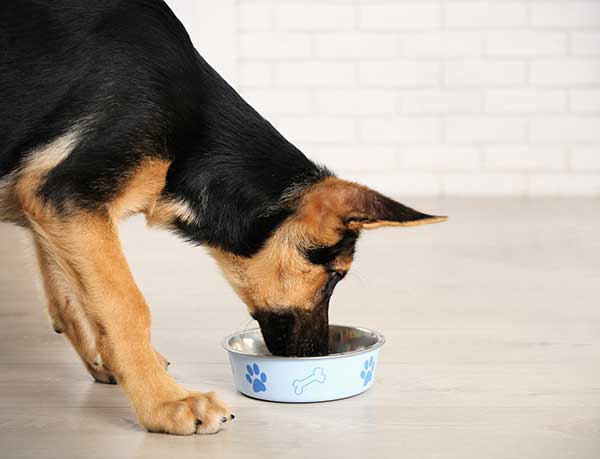
Most pet parents consider dogs as carnivores. However, our canine friends are actually omnivores.
Omnivorous animals require a diet of animal and plant-based products. So, your pooch can safely eat papaya and a host of other fruits and vegetables. But there’s a caveat.
Unlike humans who can thrive exclusively on a vegan diet, dogs are evolutionarily wired to consume more meat than vegetable. The fact that dogs are classified among the omnivorous feeding group doesn’t mean you should replace your dog’s regular food with 100% plant-based products. As you shall find, lean meat and other animal products still constitute up to 90% of a dog’s normal diet.
The implication here is that if you must feed papaya to your dog, it’s best to only do so in moderation. Papaya or any other fruits and vegetables should never replace your dog’s regular diet, which mostly comprises animal products.
Even if your pooch is a fan of papaya, it’s still imperative to moderate his intake of the fruit. Too much plant-based foods will almost always irritate your dog’s digestive tract.
Papaya’s Nutritional Profile
152 grams of papaya boasts the following nutritional profile;
- Carbohydrates: 15 grams
- Proteins: 1 gram
- Calories: 59
- Fiber: 3 grams
- Vitamin C: 157% of the recommended daily intake (RDI)
- Vitamin A: 33% of the RDI
- Vitamin B9 (folate): 14% of the RDI
- Potassium: 11% of the RDI
In addition to these minerals, papaya also contains trace amounts of Vitamins (B1, B3, B5, E, and K), calcium, magnesium, and antioxidants.
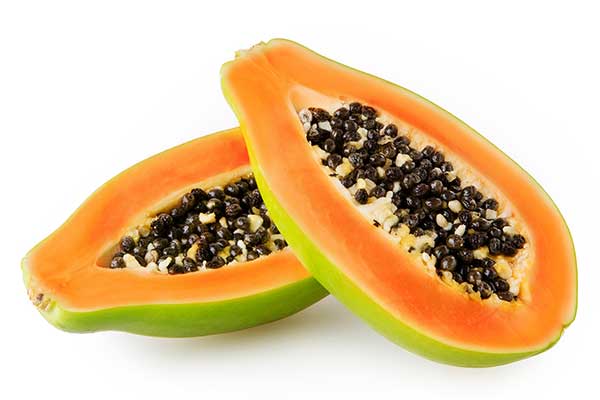
Is Papaya Good for Dogs? A Look at the Benefits
1. Aiding Digestion
Papaya is loaded with dietary fiber. The fruit contains both soluble and insoluble fiber.
Fiber is noted for its ability to aid digestion.
Soluble fiber improves digestion by nourishing the gut microbiome, the gut-friendly bacteria that live throughout the digestive tract. Soluble fiber has also been linked to reduced risks of heart and cardiovascular disease.
On the other hand, insoluble fiber may improve your dog’s digestion by adding bulk to his stool. By bulking up your dog’s stool, the insoluble fibers in papaya can help to regularize the animal’s bowel movements while also preventing constipation.
So, is papaya good for constipation in dogs?
One of the frequently asked questions among dog owners considering feeding papaya to their canine friends is, ‘can dogs have papaya for an upset stomach?’
As we’ve just explained, papaya is rich in dietary fiber which may prevent and even relieve constipation, bloating, upset stomach, and a host of other digestive complications.
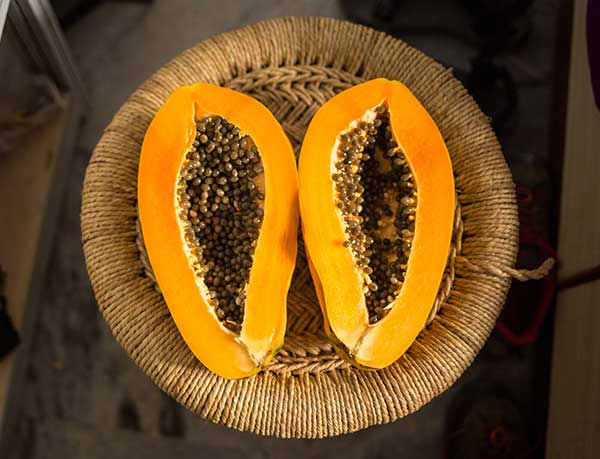
Another way papaya may aid your dog’s digestion is through an enzyme abundant in the fruit, known as papain. Papain has been cited for its ability to break down protein chains found in muscle meat.
Note that a dog’s regular diet comprises lean meat and bones, both of which may be a bit hard to break down. That makes it all the more reason to feed papaya to your dog from time to time.
Perhaps you’ve always wondered, is papaya enzyme safe for dogs?
Yes, the papain enzyme in papaya may boost digestion in dogs if fed in moderation. However, note that papain is highly sensitive and is easily denatured by heating or drying. So, you’ll need to feed your dog raw papaya for him to benefit from this enzyme.
2. Fighting Dehydration
Papaya flesh boasts significant water content.
Now, it’s a fact that some dogs may not immediately love papaya juice. Dogs don’t really have a sweet tooth as we do. But for those that love papaya juice, the juice can go a long way in helping combat dehydration.
So, if your pooch doesn’t drink as much water as he should but he happens to love papaya, you should consider offering him more papaya juice.
Just be sure not to overdo it as the carbohydrate levels in papaya could prove harmful if consumed in excess.
To reduce the potentially harmful effects of the carbs in papaya juice, consider diluting the juice before serving it to your dog.

3. Weight Management
You might also consider feeding papaya to your dog as a way of keeping the animal’s weight in check. That’s because the fiber content in papaya works synergistically with proteins to create a sense of fullness for longer.
When you mix a few papaya slices into your dog’s food, you’ll observe a significant increase in the period between meals.
Besides creating a sense of fullness for longer, papaya can also reduce the amount of food portion your dog consumes in one sitting. Again, this has a lot to do with the fiber and protein content in these fruits.
Also, remember that protein performs several other essential functions in your dog’s body.
Most notably, protein forms the building blocks of tissues, muscles, and bones. In fact, dogs cannot survive without protein in their diet. Although they probably already get an abundance of it from animal products, it doesn’t harm to supplement their protein intake by serving them papaya occasionally.
- Natural dog food with added vitamins, minerals, and nutrients delivers a Purina ONE SmartBlend of high-quality ingredients, including quality…
- Is Purina ONE good for dogs? Real lamb is the first ingredient in this high protein dog food kibble, helping supply protein for dogs that helps…
- This lamb dog food formula supports microbiome balance in your dog and is made with prebiotic fiber for dogs to help maintain your dog’s gut health…
Last update on 2025-01-17 / Affiliate links / Images from Amazon Product Advertising API
4. Boosting Your Dog’s Immunity
Another reason to consider adding papaya to your dog’s diet is that the fruit may help to boost his immunity.
The following are the various ways papaya may enhance your dog’s immunity;
i. Preventing heart disease
Papaya is high in vitamin C and lycopene. These compounds have been cited for their ability to lower the risks of heart disease.
Studies have shown that papaya also contains compounds that may enhance the protective effects of “good” HDL” cholesterol while reducing the adverse effects of “bad” LDL cholesterol.
ii. Fighting oxidative stress
Papaya boasts powerful antioxidant compounds like carotenoids. These antioxidants may boost your dog’s immunity by neutralizing free radicals in his body cells.
Free radicals are highly reactive molecules that result from metabolic activities. If allowed to accumulate in the body, these molecules may promote oxidative stress, which could lead to disease.

The antioxidant compounds in papaya are particularly helpful in keeping inflammatory diseases like osteoarthritis and cancer at bay. They may also lower the risks of other chronic conditions like obesity and diabetes.
Maybe you’ve always wondered, can diabetic dogs eat papaya?
Yes, papaya is safe for diabetic dogs. But as we’ve repeatedly emphasized, only feed papaya to your dog in moderation. That’s especially true for diabetic dogs. The high carbohydrate content in papaya may prove more harmful than useful if your dog consumes the fruit in excess. If you’re in doubt, remember to consult your vet before serving papaya to your diabetic pooch.
iii. Improving your dog’s coat
Don’t we love our dogs more when their coats exude radiance! Well, it turns out that papaya may rejuvenate your dog’s coat and fur. This has a lot to do with the fruit’s effectiveness in combatting excess free radicals in the body.
Studies have shown that too many free radicals in the boy may cause skin damage and trigger premature aging.
So, a slice of papaya once in a while may make a huge difference in terms of improving your dog’s coat and fur.
- A tasty & body nourishing treat for cats & dogs – Essential fatty acids for a healthy coat.
- Healthy, powerful Omega fatty acids – This premium Salmon Oil is rich with Omega-3 & Omega-6 fatty acid from EPA & DHA, that can help keep skin &…
- Help your pet stay looking great – The rich Omegas in Salmon Oil are a dog health supply to nourish skin and coat and keep your four-legged friend…
Last update on 2025-01-17 / Affiliate links / Images from Amazon Product Advertising API
The following are additional health benefits of papaya for dogs, based on the specific vitamins and minerals in the fruit;
Vitamin K: A fat-soluble vitamin that plays a crucial role in blood clotting. It may also boost your dog’s liver and blood health.
Lutein: Has shown potential for preventing cancer and macular degeneration.
Calcium: Helps in maintaining healthy and strong bones and teeth. It may also support muscle building as well as improve your dog’s heart and nervous system.
Potassium: Helps to maintain electrolyte balance in your dog’s body. It also aids neural function, improves muscle growth, and boosts bone health.
Magnesium: Provides energy required for cellular activities. It’s also involved in muscle coordination as well as in channeling electrical signals across the nervous system.
Is Papaya Bad For Dogs?
We’ve just gone through a number of health benefits of papaya for dogs. But before you feed these fruits to your pooch, it would help to also familiarize yourself with some of the dangers of papaya for dogs.
First off, remember what we mentioned about dogs being wired to consume more animal than plant-based products? As your dog’s digestive system is not used to processing plant-based foods, feeding papaya to him may induce a host of gastrointestinal issues.
Common symptoms of digestive distress include;
- Nausea and vomiting
- Diarrhea, which may lead to dehydration
- Bloating and flatulence
- Signs of abdominal pain and discomfort
Secondly, we’ve also highlighted the benefits of fiber in aiding digestion. But while fiber is effective at preventing constipation, too much of it can create a laxative effect and induce diarrhea. Again, this underscores the importance of feeding papaya to your dog in moderation.
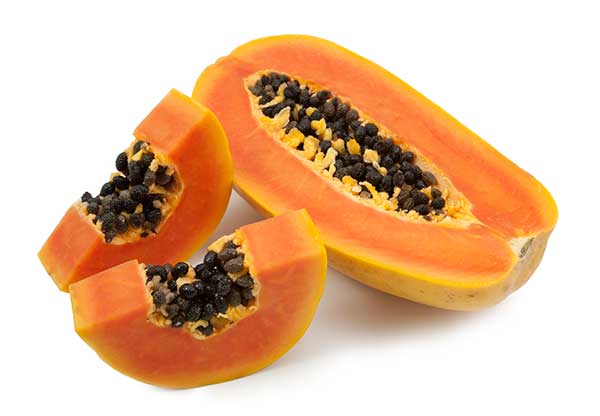
The following are other potential issues of papaya for dogs;
1. Allergies
Papayas are notorious for inducing allergic reactions in humans. Your dog may not be spared either.
Papaya-induced allergic reactions in dogs manifest in various ways, including;
- Skin itching, as is characterized by compulsive biting or scratching
- Respiratory symptoms like coughing, sneezing, and wheezing
- Symptoms of gastrointestinal distress like vomiting and diarrhea
- Irritability
- Runny eyes and/or nose
2. Choking hazards
Ripe papaya flesh is soft enough and unlikely to choke your dog. But the same cannot be said about papaya seeds and skin.
Choking may also occur if you serve your dog huge chunks of papaya. Remember that our canine friends do not take their time masticating their food as we do. Instead, they swallow it whole, thereby increasing choking risks.
3. High carbohydrate content
Papayas are relatively high in carbohydrates. That should come as good news for humans as it allows us to consume carbs in their healthier, unrefined forms. But the sugary content in papaya may prove too much for your dog’s body to handle.
If consumed in excess, the carbohydrates in papaya may trigger a range of diseases, such as obesity, diabetes, hypertension, heart disease, and dental diseases.

Can Dogs Eat All Papaya Parts?
When many people think of papaya, what usually comes to mind is the juicy flesh. But like most fruits, papayas also have thick outer skin as well as seeds.
Now that it’s perfectly okay to feed papaya to dogs, it’s natural to find yourself wondering whether it’s safe to also give your pooch papaya skin and seeds.
Can dogs eat papaya skin?
Papaya skin, also known as papaya peel, may be poisonous to dogs. That’s mainly due to the parasites lodged between the peels, as well as pesticide residues.
Besides harboring parasites and toxic chemical residues, papaya skin may also be a bit difficult for your dog to digest. Not to mention, the skin is usually quite bitter.
So, can dogs eat papaya peel?
Papaya peel is technically papaya skin. And since dogs shouldn’t eat papaya skin, it goes without saying that they shouldn’t eat papaya peel either.
Can dogs eat papaya seeds?
Much like papaya skin, papaya seeds present choking hazards due to their difficulty to chew and digest. When swallowed, the seeds may cause intestinal blockage.
Papaya seeds may also be toxic to dogs as they contain small amounts of cyanide.
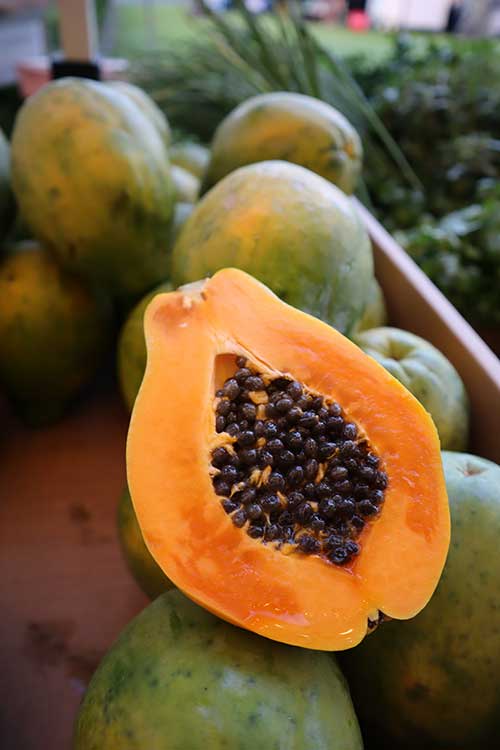
Can dogs eat papaya leaves?
Papaya leaves are discouraged because they may harbor parasites and harmful chemical residues. The leaves also present choking hazards. And just like papaya peel, papaya leaves can be quite bitter.
So, are papaya leaves poisonous to dogs?
Yes, papaya leaves may contain toxic chemical residues.
Can dogs have papaya juice?
Papaya juice can be useful in combating dehydration. However, ensure you dilute the juice before serving it to your dog.
Since papaya juice is pure sugar, too much of it may cause weight gain, obesity, diabetes, and heart disease.
- ???? ORIGINAL PROBIOTICS FOR PETS SINCE 2008: Boasting 360 scoops (that’s an impressive 360 Billion CFU per jar), our Probiotic Miracle supplement…
- ???? AMERICA’S #1 TRUSTED PET PROBIOTIC: Combat dog diarrhea, yeast overgrowth, loose stool, bad breath, constipation, itching & scratching,…
- ???? ENDORSED BY VETERINARIANS: No rice, no maltodextrin. Our vegetarian, gluten-free, grain-free formula contains zero dairy, soy, fillers,…
Last update on 2024-12-23 / Affiliate links / Images from Amazon Product Advertising API
Can Dogs Eat Cooked Papaya Or Should You Serve The Fruit Raw?
Being a fruit, it’s intuitive to want to feed raw papaya to your canine friend. However, there might still be some dog owners out there wondering, can dogs have raw papaya or should I cook it first?
Raw papaya is safe for dogs. In fact, vets recommend feeding dogs raw papaya than cooked ones. Just be sure to peel the fruit carefully and take out the seeds.
Now that dogs can eat raw papaya, you might also wonder, can dogs eat ripe papaya?
As with most fruits, the chances are that your dog will enjoy ripe papayas than unripe ones. But even for ripe papaya, remember to remove the pesky seeds before offering the fruit to your pooch.
Although feeding your dog raw papaya allows him to benefit from most of the fruit’s nutritional elements, it’s reassuring to know that you can also feed cooked papaya to your dog. Just ensure you steam the fruit to avoid denaturing its essential minerals. Also, cook papaya without onion, garlic, salt, and fats. While these are basic ingredients when preparing human food, they can be highly toxic to dogs.
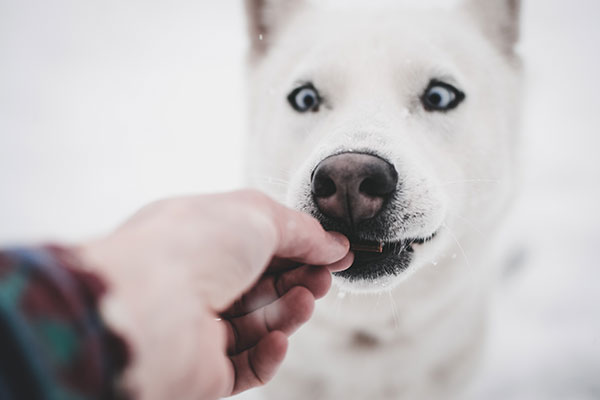
Another thing to note here is that the cooking method also matters a lot. And that brings us to the following questions;
Can dogs eat pickled papaya?
Pickled papaya is safe for dogs if it doesn’t include garlic or onion.
Can dogs eat roasted papaya?
Roasted papaya is also safe for dogs as long as you don’t top it with sugar or cinnamon.
Can dogs have canned papaya?
Canned papaya is recommended as it packs the nutritional benefits of papaya as well as enough water content that may help combat dehydration. However, always read up the ingredients list carefully to ensure the product contains all compounds considered safe for dogs.
Can dogs eat dehydrated papaya?
If you’ve always wondered, ‘can dogs eat dried papaya,’ the answer is – not recommended. That’s because dry or dehydrated papaya is more concentrated in sugars. It also presents higher choking risks.
Last update on 2025-01-17 / Affiliate links / Images from Amazon Product Advertising API
Does The Color Matter?
Besides the preparation methods, it’s also important to select papayas for your dog based on the color.
Here are a few questions to help you make an informed choice in that regard;
Can dogs eat black papaya?
Black papayas simply refers to papaya infected with fungi. Such are considered harmful to dogs.
Can dogs eat white papaya?
White papaya flesh denotes papaya that isn’t ripe enough. Choking is the most common risk of feeding white papaya to dogs.
Can dogs eat green papaya?
Some dog owners also do wonder, is green papaya good for dogs?
Green papaya skin also indicates that the fruit isn’t fully ripe. Much like white papaya, green papaya may present choking hazards.
Can dogs eat pink papaya?
Pink papaya is an exotic papaya variety that most dogs will love.
Can dogs eat golden papaya?
Golden papaya is simply the ordinary papaya fruit on your local store shelf. So, it’s perfectly safe for dogs if properly served.
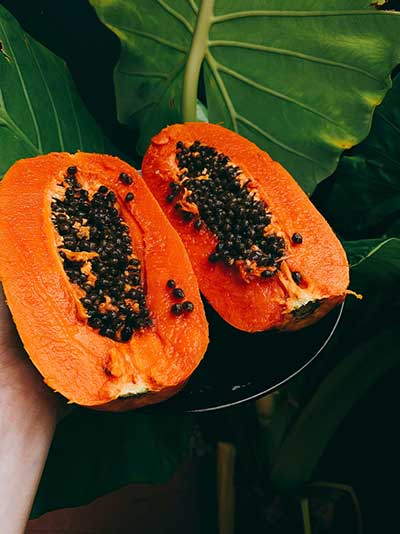
How Much Papaya Should You Serve Your Dog?
Lastly, there’s the question of portions. Which begs the question, how much papaya can a dog eat?
As we’ve already emphasized, moderation is key. Start with the lowest amounts possible and watch out for any adverse reactions before increasing the sizes.
Still on portions, you may be wondering, can dogs eat whole papaya?
Dogs shouldn’t eat whole papaya for the obvious risks of choking.
But since dogs can eat papayas, does that make the fruits safe for puppies too? Can puppies eat papaya?
No, puppies have a more sensitive stomach and shouldn’t eat papaya or any other fruit for that matter.

Conclusion
Not only is papaya safe for dogs. The fruit also offers various nutritional and health benefits. But as with most fruits, moderation is key when feeding papaya to your pooch.
Checkout Our Favorite Dog Products
1. BEST PUPPY TOY
We Like: Snuggle Behavior Toy with Heart Beat & Heat Pack – Ideal toy for new puppies.
2. BEST DOG TRAINING PROGRAM
We Like: Doggy Dan The Online Dog Trainer – Stop any dog problem and raise the perfect puppy with The Online Dog Trainer.
3. BEST DOG PUZZLE TOY
We Like: Outward Hound Interactive Puzzle Toy – Every dog loves chasing squirrels at the park. The Outward Hound Hide-a-Squirrel Puzzle Toy gives your dog the same feeling as though he was outdoors chasing live squirrels.
4. Best Bone Broth for Dogs
We Like: (Solid Gold – Human Grade Bone Broth for Dogs) – Simmered Beef Bone Broth With Turmeric Provides A Nutrient-Dense And Flavorful Addition To Your Dog’s Meal + Rich In Natural Collagen From Beef Bones.
5. Best Multivitamin for Dogs
We Like: PetHonesty 10-For-1 Multivitamin – 10 Benefits in 1 Daily Treat – These Multivitamin Snacks combine a well-rounded blend of the most essential vitamins and supplements including glucosamine, probiotics, vitamins and omegas, for dogs’ overall daily health.

